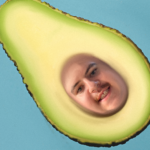The Food, The Patriachy & We
Can we please stop sexualising fruits?
Popping the cherry. The aubergine emoji. The banana emoji. Peach = bunda. Sliced lemon or orange = vulva. Nice melons. Peaches and Cream. Are you feeling it now, Mr. Krabs?
Fruits have become associated with women, and not in a good way. We know that in almost every setting women are sexualised. That’s how the patriarchy and the male gaze goes. We see it in films, like Black Widow’s tight outfits in Marvel, or Pamela Anderson sexualised by work, press and people. It seems the patriarchy seeps its way into every facet – including fruit.
Women and fruit have been buddies throughout history. The Creation Story sees Eve eating the forbidden fruit (contrary to popular belief, theologians argue the forbidden fruit wasn’t an apple). Female artists in the 16th painted table fruit. Fruit painting trended in female art because it didn’t require a live model, something that was confined by men. We see that Frida Kahlo painted fruit to make political statements, sexuality being a present theme as well. Though note that sexuality is not the same as sexualising. Fruit has become unnecessarily sexualised, and that’s where the problem lies.
How is it, then, that fruit has become sexualised? It’s the result of patriarchy and capitalism. For one, we live in a male dominated society. In the same society we, the masses, are targeted to consume products – film, art, music, advertisements, news, food and more. We call this consumption of products mass culture – mass produced items for the mass, fabricated by corporations to make profit. And we don’t control the products we consume, we consume what is deemed popular by corporations. So, for example, applying the saying ‘sex sells’ to capitalist products opens our eyes to how and why fruits are sexualised. It’s become popular, trendy and above all, normalised to sexualise fruits in reference to women, a phenomena unchallenged by the patriarchy.
I want to add more on the normalisation of sexualising fruits. Our society more than ever before is pumped with sex. Globalisation and interconnectedness permeates into our daily lives. We see sexualisations in social media, pornography, movies, Netflix, literature. This normalisation scribbles the line of appropriate sexualisations. Nowadays, young children are aware that the way they eat bananas alludes to innuendos. They are also aware that a peach often references the female butt. Knowing that young children, at a time period of cherished innocence, are aware of very adult objectifications tells us that something is wrong. This ‘something’ being the many ways sexualisaiton, in this case through fruit, has gone too far.
I experience the sexualisations of fruit daily. I can’t eat a banana in public without feeling like I’m being sexualised. Maybe when I’m alone, but even then I feel like the walls around me are spies for the patriarchy. I’ve learnt to pull apart a banana in small bits, and eat it in those bits so I’m not referencing oral sex. Being too uncomfortable to eat some simple food because it becomes sexual is anothet telling sign of something gone wrong. I beg you, let a banana be a banana.
While most of this discussion takes a negative approach to the sexualisaiton of fruit, fruit can be a celebration of femininity. If I ask you to imagine a sensual fruit image you’ve seen, you might picture a finger fingering a lemon or orange or milk oozing out of a strawberry. To some, those fruitful images showcase the reclamation of women’s sexuality in art, celebrating the female gaze. And it can mean that, but we should be attentive. The patriarchy and capitalism are the two forces which control our society. The celebration of women’s sexuality through fruit can easily become ensnared in sexualisation.
Here we can see fruit is a political agent. It has the power to activate gendered divisions, reinforcing the sexualisation of women. It is the result of patriarchy and capitalism which is why, dear comrades, we must move towards socialism. A spectre is haunting our society, a spectre of hope. Where women can eat fruit in peace and we no longer live under capitalism. Join the collective, follow.




